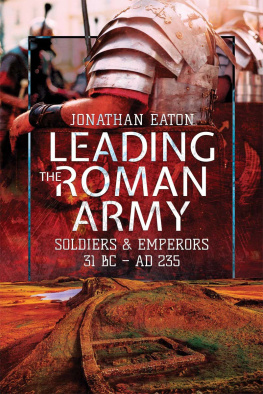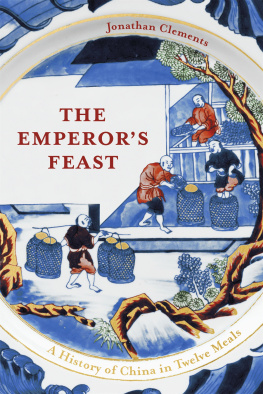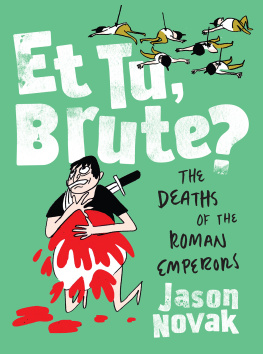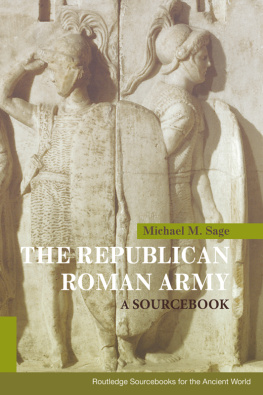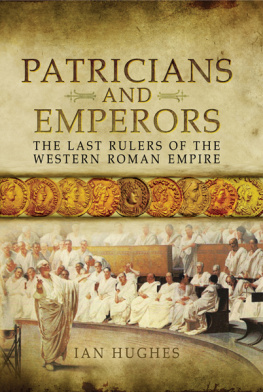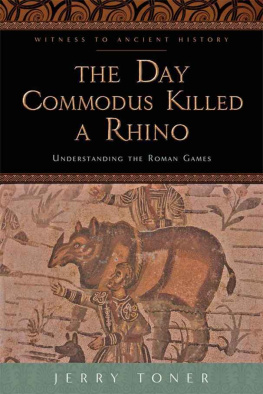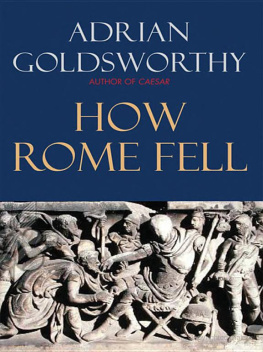Jonathan Mark Eaton - Leading the Roman Army: Soldiers and Emperors, 31 BC – 235 AD
Here you can read online Jonathan Mark Eaton - Leading the Roman Army: Soldiers and Emperors, 31 BC – 235 AD full text of the book (entire story) in english for free. Download pdf and epub, get meaning, cover and reviews about this ebook. year: 2020, publisher: Pen and Sword Military, genre: Religion. Description of the work, (preface) as well as reviews are available. Best literature library LitArk.com created for fans of good reading and offers a wide selection of genres:
Romance novel
Science fiction
Adventure
Detective
Science
History
Home and family
Prose
Art
Politics
Computer
Non-fiction
Religion
Business
Children
Humor
Choose a favorite category and find really read worthwhile books. Enjoy immersion in the world of imagination, feel the emotions of the characters or learn something new for yourself, make an fascinating discovery.
- Book:Leading the Roman Army: Soldiers and Emperors, 31 BC – 235 AD
- Author:
- Publisher:Pen and Sword Military
- Genre:
- Year:2020
- Rating:4 / 5
- Favourites:Add to favourites
- Your mark:
- 80
- 1
- 2
- 3
- 4
- 5
Leading the Roman Army: Soldiers and Emperors, 31 BC – 235 AD: summary, description and annotation
We offer to read an annotation, description, summary or preface (depends on what the author of the book "Leading the Roman Army: Soldiers and Emperors, 31 BC – 235 AD" wrote himself). If you haven't found the necessary information about the book — write in the comments, we will try to find it.
Leading the Roman Army: Soldiers and Emperors, 31 BC – 235 AD — read online for free the complete book (whole text) full work
Below is the text of the book, divided by pages. System saving the place of the last page read, allows you to conveniently read the book "Leading the Roman Army: Soldiers and Emperors, 31 BC – 235 AD" online for free, without having to search again every time where you left off. Put a bookmark, and you can go to the page where you finished reading at any time.
Font size:
Interval:
Bookmark:
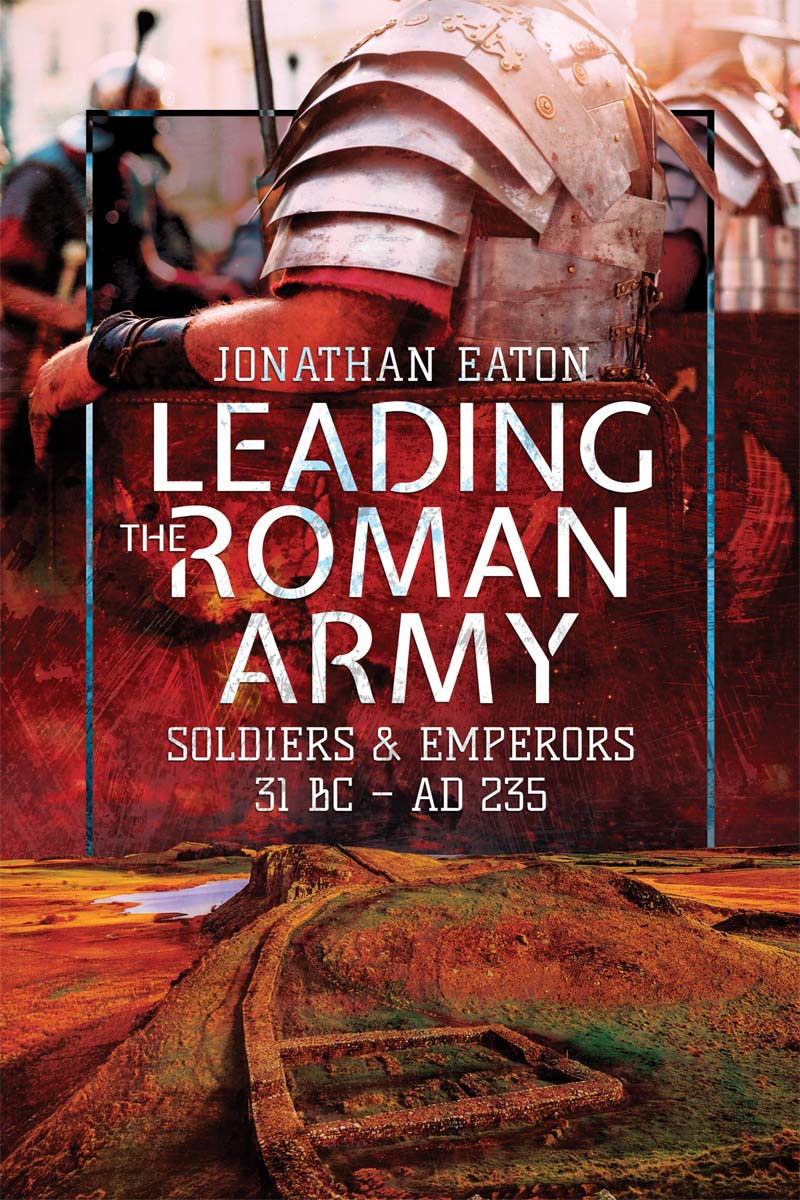

LEADING THE
ROMAN ARMY
LEADING THE ROMAN ARMY
Soldiers & Emperors
bc
ad
Jonathan Eaton

First published in Great Britain in 2020 by
Pen & Sword Military
An imprint of
Pen & Sword Books Ltd
Yorkshire - Philadelphia
Copyright Jonathan Eaton, 2020
ISBN 978 1 47385 563 2
eISBN 978 1 47385 564 9
Mobi ISBN 978 1 47385 565 6
The right of Jonathan Eaton to be identified as the Author of this work has been asserted by him in accordance with the Copyright, Designs and Patents Act 1988.
A CIP catalogue record for this book is available from the British Library.
All rights reserved. No part of this book may be reproduced or transmitted in any form or by any means, electronic or mechanical including photocopying, recording or by any information storage and retrieval system, without permission from the Publisher in writing.
Pen & Sword Books Ltd incorporates the Imprints of Pen & Sword Archaeology, Atlas, Aviation, Battleground, Discovery, Family History, History, Maritime, Military, Naval, Politics, Railways, Select, Transport, True Crime, Fiction, Frontline Books, Leo Cooper, Praetorian Press, Seaforth Publishing, Wharncliffe and White Owl.
For a complete list of Pen & Sword titles please contact
PEN & SWORD BOOKS LIMITED
47 Church Street, Barnsley, South Yorkshire, S70 2AS, England
E-mail: enquiries@pen-and-sword.co.uk
Website: www.pen-and-sword.co.uk
or
PEN AND SWORD BOOKS
1950 Lawrence Rd, Havertown, PA 19083, USA
E-mail: uspen-and-sword@casematepublishers.com
Website: www.penandswordbooks.com
This book has enjoyed a long gestation. Its genesis lies in a childhood fascination with the Roman army, encouraged by family holidays to Hadrians Wall and weekend visits to Ribchester. My interest in the command structures of the Roman imperial army was further developed during undergraduate and postgraduate study. In particular, it was encouraged by reading the classic work The Emperor and the Roman Army: 31
BC
AD
235. I subsequently had the opportunity to study under the supervision of Professor Brian Campbell at the Queens University, Belfast. The research undertaken during this period, supported by funding from the Northern Ireland Department for Employment and Learning, shaped the development of this book.
My passion for the management and operation of the Roman army has been shaped by two extraordinary teachers. Derek Slater introduced me to the rigorous academic study of ancient history based upon a close reading of the classical sources, and believed in me when few others did. Professor Brian Campbell shaped my thinking as a researcher, while advocating a critical approach to the established scholarly literature and encouraging me to situate my own work within its contemporary academic context.
With any piece of writing, it is often the authors family who pay the highest price in the form of lost time. For this reason, this book is dedicated to Jake, Millie, Heidi and Penny, of whom I am more proud than they will ever know.
Many dire events, and particularly those which befell the Romans after the death of Nero, bear witness to this and show plainly that an empire has nothing more fearful to show than a military force given over to untrained and unreasoning impulses.
The Empire arose out of a violent usurpation that was the culmination of a series of destructive civil wars waged by rival army commanders. Augustus was the last survivor of a line of generals who used military support to enforce their political will. In securing his pre-eminent position, it was imperative that Augustus prevent his troops from being used against him by ambitious army commanders. In this he was remarkably successful. Over the next two centuries, there would be only two periods of prolonged civil conflict and, in both cases, these were the result of the sudden demise of an established dynasty. Augustus army reforms represent his greatest achievement.
During the late Republic, soldiers participated in the political machinations of their commanders, to whom they were bound by personal oaths of allegiance. This process began with Marius enlistment of the capite censi, who were reliant on him to provide them with land on their discharge from active service. The civil wars between Marius and Sulla and later between Caesar and Pompey were symptomatic of the soldiers availability as a political weapon. The troops were not silent partners in this relationship and indeed used their military strength to further their own self-interest. But personal loyalty also influenced their actions. It is noteworthy that by the end of the Republic, soldiers viewed their allegiance as belonging to individual generals rather than to the res publica. A Pompeian deserter lamented to Julius Caesar: I wish that the immortal gods had made it that I were your soldier rather than Gnaeus Pompeys, and that I were showing my constancy of courage in your victory rather than his defeat.
In the aftermath of the assassination of Caesar, soldiers took an active role in influencing the political scene. His veterans were eager to avenge their fallen leader and looked to Octavian to fulfil this expectation. Self-interest also motivated their desire to avenge Caesar as they wanted the land rights, which he had granted to them, to be upheld by his successors. For this reason, the soldiers were concerned about the solidarity of the Caesarian faction. Veterans and centurions, in particular, emphasized the need for reconciliation between Antonius and Octavian. As Caesars adopted son, Octavian could claim the loyalty of the veterans as the successor of their patron. Yet the soldiers had extremely limited aims and lacked any long-term political vision. Their eagerness to achieve a united front between Antonius and Octavian evaporated once their needs had been met, and they had no qualms about fighting their former comrades when the split between them later became irrevocable. Soldiers actions under the late Republic created a clear precedent for troops to intervene politically to further their own aims.
After Actium and the final defeat of Antonius, Octavian oversaw the return of political stability and peace across the empire, as symbolized by the closing of the Gates of Janus, for only the third time in Roman history, in 29 bc. Alongside the necessary demobilization and settlement of Triumviral veterans was a pressing need for the depoliticization of the remaining military formations. Octavian accomplished this by instituting sweeping army reforms that ensured that the privileges and terms of army service would henceforth be under the control of the emperor rather than individual army commanders. Lengths of service, pay and discharge privileges for the various branches of the military were standardized. Soldiers salaries and discharge benefits would now be dispensed from the aerarium militare, which was created out of a significant portion of the emperors personal fortune and supplemented through the raising of new taxes. The temporary armies of the Republic were comprehensively replaced by a permanent imperial institution, which owed its existence and status solely to the emperor.
Font size:
Interval:
Bookmark:
Similar books «Leading the Roman Army: Soldiers and Emperors, 31 BC – 235 AD»
Look at similar books to Leading the Roman Army: Soldiers and Emperors, 31 BC – 235 AD. We have selected literature similar in name and meaning in the hope of providing readers with more options to find new, interesting, not yet read works.
Discussion, reviews of the book Leading the Roman Army: Soldiers and Emperors, 31 BC – 235 AD and just readers' own opinions. Leave your comments, write what you think about the work, its meaning or the main characters. Specify what exactly you liked and what you didn't like, and why you think so.

